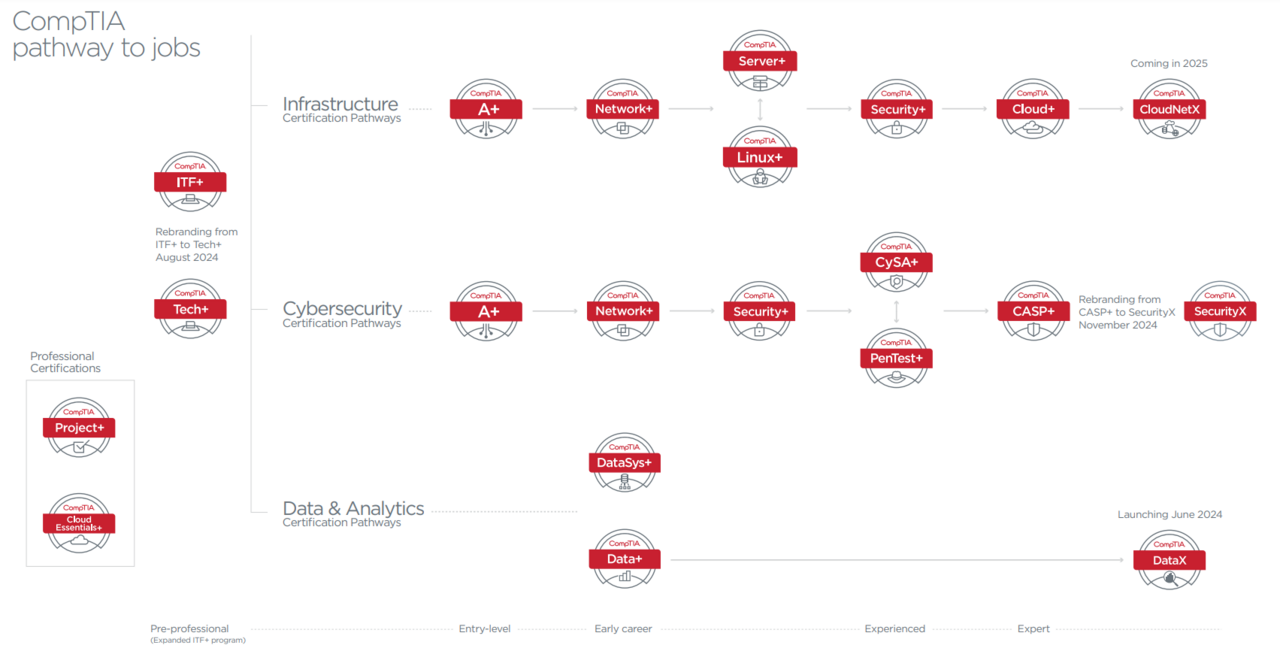CompTIA certifications explained: Overview of every CompTIA certification
CompTIA, a leading authority in IT certifications, has been a trusted name in the industry for over 30 years. With a wide range of certifications covering various aspects of IT, CompTIA has established itself as a benchmark for professionals seeking to validate their skills and knowledge.
Whether you're just starting your IT journey or looking to specialize, CompTIA offers a certification path that can help you reach your goals, opening doors to new career opportunities and higher salaries.

FREE role-guided training plans
Value of CompTIA certifications
You might wonder, "Are these certifications really worth it?"
And the answer is a resounding "Yes."
CompTIA certifications are widely recognized in the IT industry. They're like a stamp of approval that tells employers you know your stuff. But it's not just about impressing employers. A recent survey by ISACA found that 87% of employers consider IT and cybersecurity credentials important in their hiring decisions, and many cybersecurity certifications like Security+ and Network+, are often required for specific job roles within the industry.
But that's not all. These certifications can give your paycheck a nice boost. For example, the Security+ certification is the most popular entry-level credential in the cybersecurity field and leads to roles such as security administrator, information security analyst and cybersecurity specialist. Security+ holders in the U.S. earn an average of $99,446. For those holding more advanced certifications like the CompTIA Advanced Security Practitioner (CASP+), the average salary can rise significantly, reaching as high as $165,661.
For more details on what you can make as a certified professional, check out our comprehensive Cybersecurity Salary Guide.
Comprehensive overview of CompTIA certifications
CompTIA offers a range of certifications that cater to different career paths and skill levels. The certifications are grouped into three tracks: Cybersecurity, Infrastructure and Data and Analytics.

Cybersecurity
- A+: Perfect for entry-level IT professionals, covering foundational IT concepts like hardware, software, troubleshooting and networking.
- Network+: Focuses on networking principles and practices, essential for anyone specializing in network infrastructure.
- Security+: An entry-level certification for cybersecurity, covering basic principles, risk management and network security. Highly sought after by employers.
- CySA+: Aimed at intermediate-level cybersecurity professionals, focusing on behavioral analytics to improve overall IT security.
- Pentest+: Designed for professionals in penetration testing and vulnerability management, emphasizing hands-on skills.
- CASP+ (soon to be SecurityX): An advanced certification for experienced security professionals, emphasizing enterprise security, risk management and incident response.
Infrastructure
- A+: As mentioned in the cybersecurity section, this covers the basics of IT.
- Network+: As mentioned above, it's essential for networking careers.
- Server+: Focuses on server architecture, administration, storage, and troubleshooting crucial for server management roles.
- Linux+: Provide skills in Linux operating system management and troubleshooting, important for roles and environments using Linux.
- Security+: As mentioned in the cybersecurity section, it covers foundational cybersecurity skills.
- Cloud+: Covers cloud computing environments, essential for cloud infrastructure roles.
- CloudNetX: Emerging certification that focuses on advanced cloud networking skills.
Data and Analytics
- DataSys+: Focuses on data systems and their management — crucial for database administrators.
- Data+: Covers data analytics, visualization and reporting — important for data analyst roles.
- DataX: Emerging certification for advanced data management and analytics skills.
Other CompTIA certifications
Pre-professional
- ITF+: Introduces basic IT knowledge and skills, perfect for individuals considering a career in IT.
- Tech+: Designed for those just starting out, covering basic technology knowledge.
Professional
- Project+: Validates project management skills essential for IT projects, useful for both IT professionals and project managers.
- Cloud Essentials+: Provides foundational knowledge on cloud computing, vital for understanding cloud services and concepts.
Stackable CompTIA certifications
Stackable certifications show that you've earned multiple CompTIA certifications, showcasing your extensive knowledge and experience, which can significantly boost your IT career. While stacking certifications is not mandatory, it's a useful strategy for understanding how they fit together and for earning new credentials by combining multiple certifications.
CompTIA stackable certifications follow two main career pathways: the Infrastructure Career Pathway and the Cybersecurity Career Pathway. Within each pathway, certifications are categorized by experience level: Specialist (0-2 years), Professional (2-5 years) and Expert (5+ years).
In the Infrastructure Career Pathway, you can stack the following certifications:
- IT Operations Specialist: A+/Network+
- Systems Support Specialist: A+/Linux+
- Cloud Admin Professional: Network+/Cloud+
- Network Infrastructure Professional: Network+/Server+
- Linux Network Professional: Network+/Linux+
Certification stacks in the Cybersecurity Career Pathway include:
- Secure Infrastructure Specialist: A+/Network+/Security+
- Secure Cloud Professional: Security+/Cloud+
- Security Analytics Professional: Security+/CySA+
- Network Vulnerability Assessment Professional: Security+/PenTest+
- Network Security Professional: Security+/PenTest+/CySA+
- Security Analytics Expert: Security+/CySA+/CASP+
- Secure Infrastructure Expert: Security+/CySA+/PenTest+/CASP+
Preparing for CompTIA certifications
There's more than one way to prepare for CompTIA certifications, accommodating different learning styles and schedules. Our guide on the best ways to train for your cybersecurity certification highlights five effective methods:
- Self-study: Use online resources, books and practice exams to prepare at your own pace. This method offers flexibility and allows you to tailor your study schedule to fit your personal and professional life.
- On-demand learning: Enroll in structured online courses that offer video lectures, quizzes and assignments to go through at your own pace. This is ideal for those who prefer a more guided approach without the constraints of a fixed schedule.
- Self-paced with support: Combine self-study with access to instructors or mentors who can provide guidance and answer questions as you progress through the material. This method ensures you have support when you need it while still maintaining flexibility.
- Live boot camps: Attend intensive, instructor-led training sessions that typically span several days. These boot camps offer a deep dive into the material and often include hands-on labs and real-world scenarios to reinforce learning.
- Immersive boot camps: Engage in longer, more comprehensive boot camps that provide an immersive learning experience. These programs may last several weeks and are designed to fully prepare you for certification exams and real-world applications.
As an authorized training partner, Infosec offers a range of training options for CompTIA certifications. Visit the following pages to learn more information:
- CompTIA A+
- CompTIA Network+
- CompTIA Security+
- CompTIA Cybersecurity Analyst (CySA+)
- CompTIA PenTest+
- CompTIA CASP+
- CompTIA Linux+
- CompTIA Cloud+
- CompTIA Data+
Which CompTIA certification is right for you?
Choosing the right CompTIA certification depends on your career goals and current skills. For beginners, the A+ certification lays a solid foundation. Security+ is ideal for those starting in cybersecurity, while the Network+ is crucial for understanding networking basics. Advanced positions may require specialized certifications like CySA+ or PenTest+.
CompTIA certifications are highly valued, enhancing employability and career growth. Employers respect these credentials for their rigor and relevance, ensuring that certified professionals are well-prepared for the challenges of the IT world.
The outlook for cybersecurity professionals is promising, with a growing demand for skilled experts. CompTIA continuously updates its certifications to reflect industry changes, ensuring that professionals stay ahead of the curve. Investing in the right CompTIA certification can open doors to new opportunities and career advancements in IT and cybersecurity.
Other common CompTIA certification questions
Here are some of the most frequently asked questions about CompTIA certification:
What CompTIA certification is most valuable?
There's no single "most valuable" CompTIA certification, as the best choice for you depends on your career goals. However, Security+ stands out as the most popular entry-level cybersecurity certification. Understanding networks (covered by Network+) and cloud concepts (covered by Cloud+) is also becoming increasingly important across many IT specializations.
Do employers look at CompTIA?
Absolutely. For cybersecurity careers, the Security+ certification is the most requested CompTIA certification in U.S. job openings, second only to the more advanced CISSP certification, according to CyberSeek. CompTIA's long-established reputation in the industry reinforces the credibility and value of its certifications.
How many CompTIA certifications are there?
CompTIA currently offers 16 separate certifications, covering a wide range of IT specialties, from basic computer hardware to advanced cybersecurity and cloud computing. More are in the works, and you can stack certifications for even more credentials.
Is it worth getting a CompTIA certification?
In a word, yes! CompTIA certifications can significantly enhance your career prospects by validating your skills and knowledge. This can translate to significant career advantages and potentially higher earning potential.
Are CompTIA exams difficult?
The difficulty level varies depending on the specific certification. CompTIA exams assess your understanding of core IT concepts and your ability to apply them in real-world scenarios. Here at Infosec, we're a proud CompTIA-authorized training partner, and our instructors have helped countless students achieve success with an impressive 93% pass rate!
Get your guide to the top-paying certifications
With more than 448,000 U.S. cybersecurity job openings annually, get answers to all your cybersecurity salary questions with our free ebook!
How much does it cost to get CompTIA certified?
The cost of getting CompTIA certified can be divided into two main parts: exam vouchers and training materials. According to the CompTIA website, exam vouchers typically range from $138 (for the IT Fundamentals+ exam) to $509 (for the CASP+ exam). Training materials can vary widely in cost, from free online resources to several thousand dollars for comprehensive boot camps.





